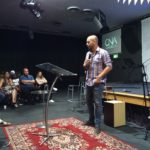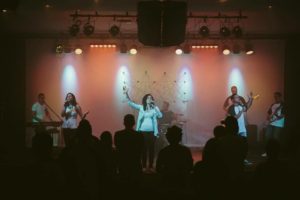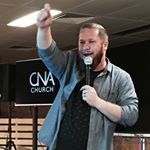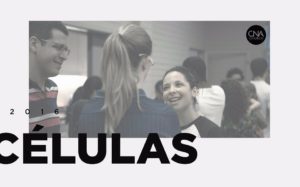COMUNIDADE NOVA ALIANÇA (CNA) TIMELINE
1983 (March 31): Eduardo Ramos was born in Governador Valadares, MG, Brazil.
1985 (March 26): Debora Oliveira was born in Brasília, DF, Brazil.
1986 (July 21): Jonathan Bolkenhagen was born in Planalto, RGS, Brazil.
2001: Eduardo Ramos moved to Australia with his parents.
2002: Debora Oliveira moved to Australia with her parents.
2002: Eduardo Ramos and Debora Oliveira met at the Brazilian church “Assembleia de Deus na Australia Church” (Assemblies of God in Australia)
2003: Eduardo Ramos and Debora Oliveira left “Assembleia de Deus na Australia Church” and joined another Brazilian church called “Assembleia de Deus na Australia Ministério Aguia.” This Brazilian church was located at Petersham Assemblies of God Church.
2006 (December): Brazilian pastor of “Assembleia de Deus na Australia Ministério Aguia” church moved to Queensland and left the church leaderless.
2007 (January): Pastor Barry Saar (Senior Minister at Petersham Assemblies of God Church) invited Eduardo Ramos to take over the Brazilian church.
2007 (February): Eduardo Ramos and Debora Oliveira founded CNA. Eduardo became its Pastor.
2007 (February): Eduardo Ramos and Debora Oliveira married.
2007-2008: Pastor Barry Saar played the role of senior Pastor of CNA and mentor for Eduardo and Debora while the couple studied at Alphacrucis College (a Christian tertiary college and official ministry training college of Australian Christian Churches, formerly the Assemblies of God in Australia).
2008: The first church camping trip took place over Easter.
2009 (March): Pastor Eduardo Ramos was ordained by the Australian Christian Churches (ACC) and became Senior Pastor of CNA church.
2007 (October): Brazilian student Jonathan Bolkenhagen arrived in Australia and joined CNA.
2012 (May 22): Jonathan Bolkenhagen graduated from Alphacrucis College.
2012 (June 21): Pastor Eduardo Ramos was fully ordained Minister of ACC.
2012 (November 22-25): The first CNA conference was held. Pastor Vinicius Zulato of Lagoinha Church in Brazil was a special guest.
2012: After the conference, Pastor Zulato taught a mini-course on Theology to CNA Pastors to strengthen their theological foundations.
2013: Congregation members moved to Adelaide and Canberra and opened CNA connect groups in each city.
2016 (August 27): CNA Canberra held its first service.
2016: Jonathan Bolkenhagen was ordained as pastor at CNA.
FOUNDER/GROUP HISTORY
Eduardo Ramos [Image at right] arrived in Australia in 2001, when he was an eighteen year-old. Debora Oliveira arrived in 2002, when she was 16 years old. In Brazil they used to be members of Baptist churches. After they arrived in Sydney they joined and met each other at the only existing Brazilian church at the time: the Pentecostal church Assembleia de Deus na Australia Church (Assemblies of God in Australia), later renamed Igreja Avivamento Mundial (World Revival Church) (Rocha 2006). However, a year later, in 2003, the couple and a few others in the congregation left this church to join a new Brazilian church located in the premises of the Petersham Assemblies of God Church. They stayed in this new church called Assembleia de Deus na Australia Ministério Aguia until December 2006, when the Brazilian pastor moved to Queensland and left the church leaderless.
Debora Oliveira arrived in 2002, when she was 16 years old. In Brazil they used to be members of Baptist churches. After they arrived in Sydney they joined and met each other at the only existing Brazilian church at the time: the Pentecostal church Assembleia de Deus na Australia Church (Assemblies of God in Australia), later renamed Igreja Avivamento Mundial (World Revival Church) (Rocha 2006). However, a year later, in 2003, the couple and a few others in the congregation left this church to join a new Brazilian church located in the premises of the Petersham Assemblies of God Church. They stayed in this new church called Assembleia de Deus na Australia Ministério Aguia until December 2006, when the Brazilian pastor moved to Queensland and left the church leaderless.
As a result, in January of 2007 Pastor Barry Saar, the Senior Minister at Petersham Assemblies of God Church, asked the congregation to nominate someone to be trained as a Pastor to lead the church. The congregation chose Eduardo Ramos as their new Pastor. In February of 2007, Eduardo and Debora married and founded CNA. They agreed that Pastor Saar would mentor them while they studied at Alphacrucis College (a Christian tertiary college and official ministry training college of Australian Christian Churches). They were very young when they started the church (he was twenty-three and she was twenty-one); so in the first years they depended on Pastor Saar for almost everything (e.g., CNA’s theological foundations and constitution, directions on how to support congregation members and how to function as a church).
Eduardo and Debora thought their previous church was too conservative. This was so because it catered to the older generation of working class Brazilians who had arrived in Australia as part of a first wave of Brazilian migration (1970s-1990s). They wanted a less traditional church that would cater for the second wave of migration (late-1990s to present). This wave comprised of a growing number of young middle-class students who go to Australia to study English and possible migration (Rocha 2006, 2013, 2017). Eduardo and Debora envisioned a church where people could be free to dress informally, play worship music, [Image at right] and not stick too  strictly to a denomination so that they could be welcoming of young Brazilians from all walks of life. They also wanted a church heavily focused on supporting this new cohort of Brazilians arriving in Australia, as they arrived without their immediate family and were very young.
strictly to a denomination so that they could be welcoming of young Brazilians from all walks of life. They also wanted a church heavily focused on supporting this new cohort of Brazilians arriving in Australia, as they arrived without their immediate family and were very young.
Presently, the average age of congregation is twenty-five to thirty-five, and there are around ninety active members.However, because they are students in Australia, there is a high turnover in the congregation, with many arriving and others returning to the homeland. Many of them were not religious in Brazil and sought the church for emotional, social and financial support, and as a place to meet other Brazilians in the diaspora.
In 2016, another Brazilian member, Jonathan Bolkenhagen, [Image at right] was ordained pastor at CNA after graduating from  Alphacrucis College. In the same year Jonathan Bolkenhagen started commuting to Canberra to run a new branch of the church in the nation’s capital. This branch also caters for the Brazilian community there, but the congregation is a little older and comprised of families who have become Australian citizens. There are around thirty members in the Canberra congregation.
Alphacrucis College. In the same year Jonathan Bolkenhagen started commuting to Canberra to run a new branch of the church in the nation’s capital. This branch also caters for the Brazilian community there, but the congregation is a little older and comprised of families who have become Australian citizens. There are around thirty members in the Canberra congregation.
The church name can be explained in two parts: “New Alliance” refers to the alliance Jesus made at the cross with God. “Community” was chosen because the church is not representing any denomination in particular, although they are affiliated to the Australian Christian churches (former Assembly of God is Australia). The founders wanted to send a message that they accepted people from all denominations. In sum, they wanted to signal to this relationship with God and that they wanted to be a family (“community”) to followers. The church’s motto is: “a simple, happy, and transparent church.”
CNA uses the facilities of the Petersham Assemblies of God Church. Services are on Sunday evenings (as it is usual in Brazil), and therefore they do not clash with the regular English-language services on Sunday morning. CNA also has an office behind the church and is supported by Pastor Saar and his church.
Nevertheless, the founders have not circumscribed themselves to Pastor Saar’s church as a model for CNA. Given that they consider themselves non-denominational, they have continued looking for successful ways to establish themselves. One of the churches that inspires them is the Australian megachurch Hillsong (Connell 2005; Goh 2007; Riches and Wagner 2017; Rocha 2017, 2013; Wagner 2013). They admire Hillsong’s professionalism, success, informality, and non-judgemental and inclusive attitudes (in regards to dress, behaviour, and life situation) toward those who come to church. Hillsong works as a good role model because, like Hillsong, CNA is youth-oriented. CNA’s services are similar to Hillsong’s albeit on a much smaller scale: they feature a band; there is an informal atmosphere (in the Pastors’ and congregation’s language and dress style); the church is dark and real-time telecasts of the band and the song lyrics are beamed onto the screens beside the stage. Everyone in the congregation dances and sings together with the band. They may raise their arms, close eyes, or keep their hands on their hearts.
DOCTRINES/BELIEFS
CNA is a Pentecostal church affiliated to the Australian Christian Churches (formerly known as Assemblies of God in Australia). As such, it believes in spiritual gifts given by the Holy Spirit, such as glossolalia (speaking in tongues), divine healing, and prophesy. It also accepts the Bible as God’s word and believes that its lessons can be applied to people’s everyday lives.
Given that CNA is a church founded by Baptist Brazilians and is influenced by the Australian Pentecostal megachurch Hillsong, CNA has become a hybrid of a more traditional Brazilian Baptist church and a very informal, rock-concert-style Hillsong church.
On the one hand, like Hillsong, CNA can be considered a “New Paradigm” (Miller 1997) or “Seeker-friendly” church (Sargeant 2000). This style of evangelical Christianity has evolved globally since the 1960s and such churches “tailor their programs and services to attract people who are not church attenders” (Sargeant 2000:2-3). They do this by creating an informal atmosphere, using contemporary language and technology, and focusing on religious experience. Seeker churches borrow from secular models of business and entertainment, use marketing and branding principles, and innovative methods. According to Miller and Yamamori (2007:27), they “are at the cutting edge of the Pentecostal movement: they embrace the reality of the Holy Spirit but package religion in a way that makes sense to culturally attuned teens and young adults, as well as upwardly mobile people who did not grow in the Pentecostal tradition.” As a rule, their services are entertaining (featuring a live band, professional lighting and sound, large screens), and the focus is on people’s everyday lives (with topical messages on practical concerns).
On the other hand, while “New Paradigm” or “Seeker-friendly” churches focus on positive messages of God’s love rather than on sin, hell or damnation, CNA preaches also on the latter topics. CNA Pastors appreciate that young people may prefer a message of love, but they feel that they cannot focus on only love and should preach the Bible as a whole.
It is precisely this hybridity that attracts Brazilian students to CNA, as the church is able to function as a bridge between Brazilian and Australian societies and religious cultures (Rocha 2013).

RITUALS/PRACTICES
Like other diasporic churches, CNA assists migrants in the process of overcoming nostalgia,homesickness and the challenge of adapting to the new country. [Image at right] CNA offers young Brazilians a space for community-building through services, weekly connect-group meetings, camping trips, barbeques, beach parties, community meals featuring Brazilian food, and other communal leisure activities. Before and after Sunday evening services, congregants socialise in the church foyer for quite a long time. The church usually provides coffee, soft drinks and food so that congregants can meet each other and strengthen community/family feeling. [Image at right] This is an occasion for pastors to chat with congregation members and ask them about their past week and find out their needs.
and strengthen community/family feeling. [Image at right] This is an occasion for pastors to chat with congregation members and ask them about their past week and find out their needs.
Typically, pastors assist congregation members deal with issues related to their young age, being far from their immediate family as international students in Australia, their lack of English language skills, finding accommodation and jobs, and downward mobility. CNA also helps them adapt to the new life in Australia by offering training courses in barista and cleaning skills, English language and CV writing to middle-class young Brazilian students, most of whom have never experienced paid employment in their lives.
CNA holds many activities during the year. For instance, every Friday congregants meet in smaller groups or “connect groups” across the city. These groups work as support groups to give members a solid family-feel. In these meetings, members bring food to share, socialise, and study a passage of the Bible and pray together. In addition, at the beginning of the year congregants undergo a twenty-one-day fast of some kind in order to focus on members’ behaviour in regards to God and how they are working as a church. Since 2008, they have organized a four-day camping trip over Easter. In this church retreat they have two services a day, Bible study, water baptisms, and leisure activities such as soccer games. Starting in 2012, CNA has run a three-day conference every November featuring invited pastors from Brazil. Given that CNA is mainly a church for the Brazilian community, it also celebrates typical Brazilian events such as July Party (festa caipira) in addition to Christian holidays.
LEADERSHIP/ORGANIZATION
The church is led by Senior Pastors Eduardo Ramos and Debora Oliveira, as well as AssistantPastor Jonathan Bolkenhagen. CNA’s day-to-day running is divided into “ministries” that are led by congregation members who are chosen by the pastors. These ministries are: reception of new comers, hospitality (organises food for the services and events), baby club (one to three year-olds), kids (four to seventeen year-olds), youth (eighteen to thirty year-olds), worship (the members of the band that plays during service), production (videos of services and events, publicity), and social assistance.
They also have six leaders of connect groups trained and chosen by the church leadership.
ISSUES/CHALLENGES
CNA suffers from the conundrum other migrant churches face. Because they are a home away from home for Brazilians, they use Portuguese language in their services and other activities, celebrate Brazilian holidays, and espouse Brazilian religious values and worldview. However, this hinders adaptation into the local population. Furthermore, by maintaining the homeland culture, language and mores, they may alienate long-term migrants, second generation Brazilians, and those migrants who want to “integrate” quickly. At the same time, if they adopt the host country’s culture language and cultural practices wholesale, they may not be able to provide adequate support for new arrivals.
CNA Pastors are keenly aware of this problem and have organized for services to be simultaneously translated into English for those Australians who wish to join them. They know that, as young congregants marry (other Brazilians and also Australians) and have children, CNA will need to have activities in English if it wants to retain this new generation.
Another challenge is the high turnover rates within the congregation given that members are international students in Australia. Because there is always a high proportion of members arriving in the country and leaving for the homeland, it is difficult to build a strong congregation and maintain the smooth operation of the church. This also means that the church struggles with funding. As students, members do not hold full-time jobs and have low incomes. In addition, sometimes the church assists students with money, accommodation and meals if they run into financial difficulties. Another consequence of the make-up of the congregation and their low income is that pastors work full-time outside the church and have little time to work for the church.
IMAGES
Image #1: Photograph of Eduardo Ramos.
Image #2: Photograph of a worship band.
Image #3: Photograph of Jonathan Bolkenhagen.
Image #4: Photograph of a connect-group meeting.
Image #5: Photograph of serving food after a worship service.
Image #6: Reproduction of the CNA logo.
REFERENCES
Connell, John. 2005. “Hillsong: A Mega-Church in the Sydney Suburbs.” Australian Geographer 36:315-32.
Goh, Robbie. 2007. “Hillsong and ‘Megachurch’ Practice.” Material Religion 4:284-305.
Miller, Donald. 1997. Reinventing American Protestantism: Christianity in the New Millennium. Berkeley, CA: University of California Press.
Miller, Donald and Tetsunao Yamamori. 2007. Global Pentecostalism: The New Face of Christian Social Engagement. Berkeley, CA: University of California Press.
Riches, T. and T. Wagner, eds. 2017. The Hillsong Movement Examined: You Call Me Out Upon the Waters. New York: Palgrave Macmillan.
Rocha, Cristina. 2017. “The Come to Brazil Effect: Young Brazilians’ Fascination with Hillsong.” In The Hillsong Movement Examined: You Call Me out upon the Waters, edited by T. Riches and T. Wagner. New York: Palgrave Macmillan.
Rocha, Cristina. 2013. “Transnational Pentecostal Connections: an Australian Megachurch and a Brazilian Church in Australia.” Pentecostudies 12:62-82.
Rocha, Cristina. 2006. “Two Faces of God: Religion and Social Class in the Brazilian Diaspora in Sydney.” Pp. 147-60 in Religious Pluralism in the Diaspora, edited by P. Patrap Kumar. Leiden: Brill.
Sargeant, Kimon. 2000. Seeker Churches: Promoting Traditional Religion in a Nontraditional Way. New Brunswick, N.J.: Rutgers University Press.
Wagner, Thomas. 2013. Hearing the Hillsong Sound: Music, Marketing, Meaning and Branded Spiritual Experience at a Transnational Megachurch. Unpublished Ph.D. Dissertation, Royal Holloway University of London.
Post Date:
2 May 2017
